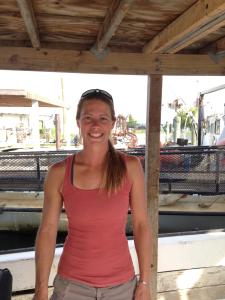Crystal Jordan

Young Fishermen in the Northeast United States
Interviews with 39 fishers between the ages of 18-35, located along the US East Coast from Maine to North Carolina. Collectively, they represent a wide variety of gear types and fisheries. All had been fishing full-time for at least two years and wanted to make fishing their career. They describe motivations for choosing a fishing career, strategies used, barriers encountered, and facilitating factors that have enabled interviewees to defy the graying trend to become successful fishermen.
Please visit the Voices SoundCloud page to explore clips and stories that relate to this collection.
Sarah Schumann
Crystal Jordan, 33 years old at the time of the interview, is the owner-operator of a blue crab and oyster vessel in Solomon's Island, MD. As the daughter of a fishermen, she grew up on the water, and took over her father's operation at the age of 20 when he passed away from cancer. Her vessel is called "Some Beach."
Scope and Content Note
In her interview, Crystal Jordan talks about overcoming the loss of her father, finding her own way as a commercial waterwoman, and raising her own son on the water as a single mother. Jordan starts by noting that she prefers the term "waterwoman" as it reflects her work on the water. Jordan describes growing up in Edgewater, an area that is fading out in terms of commercial fisheries. She explains that the decline is due to people buying houses on the water and pushing out marinas, as well as the preference for sailboats and yachts over commercial fishing boats. Jordan expresses frustration with the lack of appreciation for the work of commercial fishermen and the impact it has on the local economy. She mentions that certain areas, like Crisfield, still have a strong respect for watermen and support the local industry. Jordan says she enjoys her work as a waterwoman but acknowledges the downsides, such as the maintenance and costs associated with the boat and gear and mentions trotlining as a less expensive alternative to crab potting.
Jordan shares the story of her boat, which originally belonged to her father and underwent renovations. After her father's health issues and eventual passing, Jordan took over the boat. She says that the biggest challenge she faced initially was rebuilding the rig with limited resources. Despite doubts and financial struggles, Jordan says that she persisted in her work, relying on her connections with other watermen for support. She also expresses her love for the water and mentions that she has always enjoyed working on the boat, finding it physically demanding yet rewarding. Jordan describes how her dedication to her work paid off, and she now feels confident in her ability to support herself and her seven-year-old child. Jordan describes how she learned oystering from her son's father and considers it an easier but equally enjoyable activity. The crabbing season generally runs from April to November, while oystering occurs from October to March, with different methods and areas for each.
Please Note: The oral histories in this collection are protected by copyright and have been created for educational, research and personal use as described by the Fair Use Doctrine in the U.S. Copyright law. Please reach out Voices@noaa.gov to let us know how these interviews are being used in your research, project, exhibit, etc. The Voices staff can help provide other useful resources related to your inquiry.
The NOAA mission is to understand and predict changes in climate, weather, oceans, and coasts, to share that knowledge and information with others, and to conserve and manage coastal and marine ecosystems and resources. The Voices Oral History Archives offers public access to a wide range of accounts, including historical materials that are products of their particular times, and may contain offensive language or negative stereotypes.
Voices Oral History Archives does not verify the accuracy of materials submitted to us. The opinions expressed in the interviews are those of the interviewee only. The interviews here have been made available to the public only after the interviewer has confirmed that they have obtained consent.
